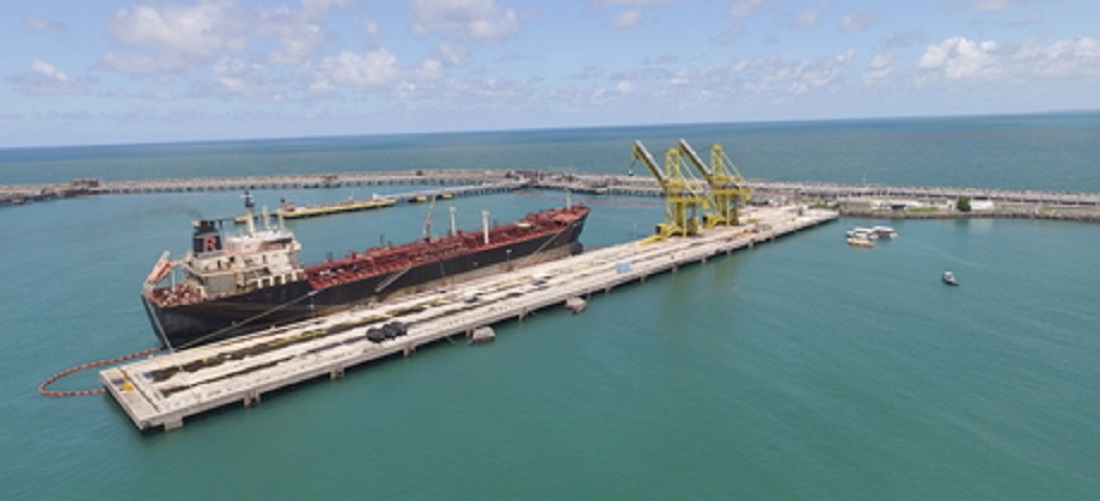
Federal Court prohibits ‘toxic’ aircraft carrier from docking in the Port of Suape
Dec, 29, 2022 Posted by Gabriel MalheirosWeek 202252
The Federal Court of Justice issued, on Wednesday, December 28, another decision against the forced docking of the tug transporting scrap from the aircraft carrier Sao Paulo in the Port of Suape, due to the presence of toxic materials in the ship.
Federal judge Leonardo Resende Martins denied the request made by the company SOK to reverse a decision that kept the convoy wandering near the coast of Pernambuco since October.
In the ruling, the judge suspended with immediate effect “any measure tending to determine the forced docking of the vessel (ex NAe Sao Paulo) in the Port of Suape, or, alternatively, in case it does happen, promote the immediate removal of the vessel, paying all costs and bearing with the risks involved.”
He stated that, in general, it is the responsibility of local authorities to oppose the docking of vessels that pose “environmental and sanitary risks” since the Union, States, Federal District, and Municipalities have the competence to “protect the environment and combat pollution in any of its forms.”
He also drew attention to the lack of formal acts by the Port Authority or other federal authorities authorizing the ship’s forced docking in the port.
The judge presented technical notes from the Board of Environmental Licensing of the State Agency for the Environment of Pernambuco (CPRH) and the Board of Environment and Sustainability of the Suape Port Industrial Complex, which points to the presence of hazardous materials on the ship – such as asbestos, paints, pipes, and mercury – which can cause contamination of marine environments and estuaries along the coast of the State.
“Once again, the lack of a pronouncement from the federal authorities makes prevail, at least in this preliminary stage, the argumentative line of the State of Pernambuco and the Industrial Port Complex of Suape,” affirmed Resende Martins.
Nonetheless, he emphasized that no one knows the exact amount of asbestos on the aircraft carrier and the presence of radioactive materials such as cadmium.
Lawyer Zilan Costa e Silva, a spokesperson for MSK and SOK, stated that he took the decision with naturality. “We will review it and, if necessary, take appropriate action,” he said. Nonetheless, he inquired once more: “If asbestos is the problem, shouldn’t all of the vessels with it be in the same condition as us? And, without the ability to travel elsewhere, without the ability to dock in Pernambuco or any other port. When do Brazilian authorities expect this situation to finish?”.
Aircraft carrier São Paulo: understand the case
The aircraft carrier São Paulo belonged to the Navy and was sold to the Turkish company SOK. When trying to enter the country, he was prevented from containing, among other substances, a load of asbestos, formerly used on ships to prevent fires but with hazardous potential.
MSK, the company contracted to tow the aircraft carrier, and SOK claimed that the ship traveled freely in Brazilian and international waters without incident until it was sold to the Turkish company in 2020.
The arrival of the ship to the coast of Pernambuco provoked indignation. The Brazilian Association of Port Terminals and the American Association of Port Authorities spoke in favor of Suape, the Association of Suape-based Companies (AsseSuape), the Suape Forum, labor unions, and academic and research entities.
Source: Jornal do Comércio
To read the full original article, please access: https://jc.ne10.uol.com.br/pernambuco/2022/12/15149486-justica-nega-pedido-de-empresa-sok-para-atracar-porta-avioes-no-porto-de-suape-entenda.html
-
Economy
Feb, 01, 2022
0
Trade balance: imports outnumber exports in January
-
Ports and Terminals
Sep, 11, 2023
0
Port of Açu signs agreement with Petrobras for platform decommissioning
-
Port Rankings
Sep, 20, 2021
0
Brazil and Plate Port Rankings – January-July 2021
-
Ports and Terminals
Apr, 11, 2024
0
Port of Imbituba reaches record with over 830 K in throughput

